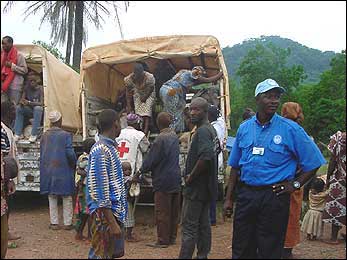UNHCR sends mission for refugees stranded in western Côte d'Ivoire
UNHCR sends mission for refugees stranded in western Côte d'Ivoire

GUIGLO, Côte d'Ivoire, December 12 (UNHCR) - The UN refugee agency has sent a team to Guiglo, western Côte d'Ivoire, in an attempt to re-establish contact with refugees stranded in and around the conflict zone. It will also assess their most urgent needs and evaluate best options for a possible evacuation.
Earlier this week, UNHCR had closed its office in Guiglo and recalled its staff to safer locations within Côte d'Ivoire amid rumours that the rebels were gaining ground.
On Wednesday, a team of three UNHCR protection and field staff left the southern city of Abidjan for Guiglo and the nearby Nicla camp, where some 5,000 refugees are registered. Many more refugees from the fighting zone, further north and west, have reportedly sought safety at Nicla camp in recent days.
The mission plans to verify this information and assess the best place to establish a transit centre in the area, to be used as a stopover en route to the refugees' point of evacuation - possibly the port of San Pedro further south, or Abidjan.
Nicla camp's population will be among the first to benefit from an evacuation operation for refugees living in Côte d'Ivoire's refugee-hosting area along the border with Liberia. There are a total of 72,000 refugees, mostly Liberians, in this area. The northern parts alone host 45,000 refugees and have been out of reach for two weeks since fresh fighting erupted there on November 28.
Since then, UNHCR has lost all contact with refugees in Danané and Toulépleu areas, situated in the conflict zone near the Liberian border, where travelling is restricted by both the Ivorian military and UN internal security measures.
As part of the refugee agency's initial assessment, another team left this week for San Pedro to start identifying potential sites for a transit centre, and to make contact with port and airport authorities.

Another option for evacuation is to open a humanitarian corridor towards Liberia in order to facilitate an emergency return of Liberian refugees, which has been taking place spontaneously in the past two weeks.
The outflow towards Liberia is continuing unabated. By Thursday, a total of 42,000 persons had reached the eastern counties of Liberia, including 28,000 Liberian returnees and 14,000 Ivorian refugees. The proportion of Ivorian refugees among them is increasing by the day.
The recent arrivals are scattered along the border in the Nimba, Grand Geddeh and Mariland counties. Most Ivorians are taking shelter with relatives or host families, hoping to be able to return to Côte d'Ivoire soon. As an emergency measure, UNHCR has dug wells and built additional latrines to help the host villages deal with the influx.
Most of the Liberian returnees initially go through transit centres set up by the refugee agency near the border, where shelter, water, sanitation and health care are available. Twenty-three trucks are shuttling each day, under very difficult road conditions, to take the returnees to their final destinations in the interior of Liberia, so as to ease the build-up at the border.
Through this arrangement, a group of 447 Liberians arrived in Monrovia on Wednesday, while 100 others were dropped off near Gbarnga in Bong county. UNHCR has very limited resources to assist the returnees so far, but they do receive one-week food rations and minimum health care upon return. The agency intends to support the most needy villages of return once funds from the $ 6.1-million special appeal for the Ivorian crisis start coming in.
Further north, several thousand Ivorian refugees have also entered Guinea in the past two weeks. Their transfer towards Nonah transit centre, near Nzérékoré, started on Monday. In addition, amid growing xenophobic tensions in Côte d'Ivoire, the Guinean government estimates that up to 75,000 Guinean nationals may have returned from Côte d'Ivoire since the crisis began on September 19.








